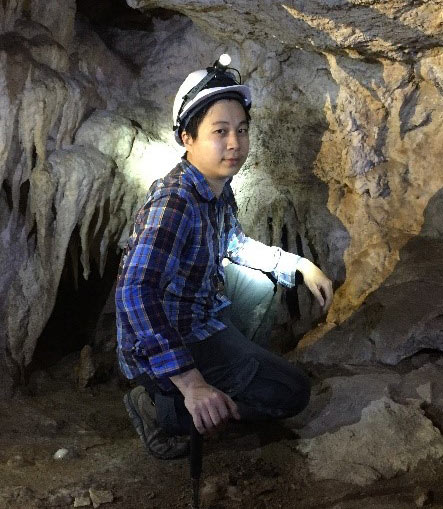December 18 2024 – 10h: international seminar Palevoprim n° 60
Speaker

Kantapon Suraprasit
Associate professor, Department of Geology, Faculty of Science, Chulalongkorn University, Bangkok, Thailand
Topic
Stable isotope applications for the study of dietary and habitat shifts among Quaternary Southeast Asian mammals
Kantapon Suraprasit is an early career paleontologist at Chulalongkorn University in Bangkok. After receiving his Master’s degrees (M1 & M2) and Ph.D. from the University of Poitiers in 2015, and completing a two-year postdoc (granted by Alexander von Humboldt Foundation) in Tübingen in 2020, he is currently a lecturer at Chulalongkorn University, teaching Paleontology, Evolution, and Historical Geology. He specializes in the field of taxonomy, paleoecology, and paleobiogeography of Neogene and Quaternary large mammals in Southeast Asia. His research interests mainly include the evolution and paleobiogeography of Southeast Asian large mammals as well as the paleoclimatic and paleoenvironmental contexts of hominin faunas, using stable isotope approaches, in Southeast Asia during the Neogene and Quaternary. He is now conducting paleontological surveys and excavations to explore the Pleistocene cave deposits in Thailand, especially the southern part of the country where only few mammal fossils have been documented so far.
Southeast Asia, a centre of global importance for terrestrial biodiversity, is a region of conservation concern due to its native habitat loss today. During the past few decades, stable carbon and oxygen isotope analyses of mammalian tooth enamel are recognized as being a powerful tool to investigate diets and habitats of past and extant sympatric species, to test the species co-occurrence patterns through time, and to guide the future habitat restoration for their surviving populations. This approach has successfully been used to document shifts or restrictions of ecological niches for some mammalian taxa that survived the last Quaternary waves of extinction in many regions, but has infrequently been applied to threatened and endangered mammal taxa in Southeast Asia.
His presentation deals with stable carbon isotope applications for the study of diets and habitats among the Pleistocene to present-day large mammals in Southeast Asia. He will demonstrate that the Holocene climate and environmental changes have considerably driven a range contraction of suitable habitats for some mammalian species. For instance, extant Sambar deer, Sumatran serows, and gaurs have shifts in diets and habitats towards more closed C3 canopy forests or show habitat restrictions in closed forests. As it is visible in the exemplary cases of merging paleoecological application with conservation biology, the stable isotope approach is helpful to guide the future habitat restoration for some threatened and endangered species in the region.
Place
Salle 410, bât. B35 (3ème étage, aile nord), université de Poitiers.




